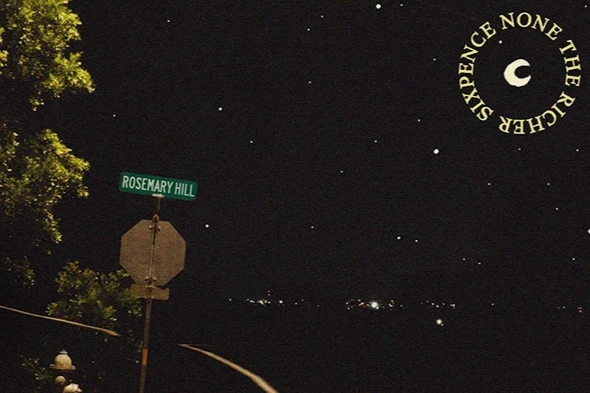Political. Religious. Activist. “The Two Americas” renamed as a National Park. U2’s career-defining album “The Joshua Tree” has a message that transcends their music — but also music that transcends their message. This is, after all, lead singer Bono’s finest effort, a masterpiece by guitarist Edge Evans and a sharp performance by drummer Larry Mullen and bassist Adam Clayton. The album exists in a sort of “sweet spot” between the band’s early days, where Edge’s wizardry and Bono’s youthful exuberance lifted an undisciplined outfit, and the peak years for Clayton and Mullen, whose heavy-hitting playing was perfect for the band’s darker Zoo TV era. The result combines earnest passion with unbelievably perfect hooks, an orchestra through the medium of stadium rock with an Irishman crooning poetry over it. Oh, and this album also has a face-melting guitar solo meant to represent American bombs falling in El Salvador. Of course. 37 years on, “The Joshua Tree” hasn’t lost its ability to enrapture audiences. More impressively, it hasn’t lost its political relevance, either. The album was created in a time of global conflict and nostalgia for an idealized America. With bombs dropping across the Middle East and presidential candidates that heavily rely on nostalgia politics, it could not be more relevant now. These are some of the songs that demand your attention.
The audible America: Where the Streets Have No Name
U2 are always intentional about their album openers: the dissonant “Zoo Station” at the top of punk experiment “Achtung Baby” is there for maximum disorientation, while the punchy, militant drumbeat of “Sunday Bloody Sunday” announced the arrival of “War.” “The Joshua Tree” is full of poignant lyricism, but its focus, from the beginning, is on the music. There’s no way to describe “Where the Streets Have No Name” to the uninitiated; it’s far too majestic to be put into mere words. It would be easier to paint the picture of the landscape that the song calls to mind than explain the sounds that produce it. The organ falls lightly like rustling leaves blowing in the wind. Then, the guitar chimes ring out, layered over snappy drums — resembling the crags of those cliffs on the album cover, perhaps. Another, loftier layer of guitar recalls the sky above, a radiant blue. This is the feeling of flying, of racing down a highway, of sitting still. This is the promise of a country of unparalleled natural beauty, of wide-open interstates, of national parks. This is America. Well, one of them, anyway.
The paradoxical America: In God’s Country
In the music video for “In God’s Country,” Bono raises one arm in a pose evoking the Statue of Liberty as he sings “she stands with a naked flame.” His response to Lady Liberty comes in the next line of the song, its last: “I stand with the sons of Cain, burned by the fire of love.” The tension between the stately monument holding up a beacon of hope and the broken reality that she stands over is thick, but so is the tension between “we hold these truths to be self-evident: that all men are created equal” and the unequal reality present in America today. Bono empathizes with those who have found that love and lofty ideals often end in betrayal, comparing the plight of many to that suffered by the Biblical Abel, who was killed by his jealous brother Cain in Genesis 4. We, Bono argues, are all children of Cain, pronouncing death upon our love and our ideals when they get in the way of what we want. Edge’s guitar toes a line between discordant rattle and his trademark uplifting chime. Considered alone, the sound of Clayton’s bass is a sinister thrum; with the rest of the band filling in around it, it is an uplifting harmony. Even the song’s symbols can be either uplifting or destructive: a river, a cross, a drug, a fire, a rose. Petals and thorns, all of it.
The stifling America: Bullet the Blue Sky
Mullen comes out pounding, like John Bonham in the legendary Led Zeppelin hit “When the Levee Breaks,” except with a militant intensity. Once he’s certain you’re awake, Mullen is joined by the sound of an ominously creaking guitar. If the dry rattle emanating from the general vicinity of Clayton or the accompanying distorted wail that is forced through the speakers were to be played in a horror movie, one would be unable to escape the feeling that the movie’s characters should probably start running. So too were the people of El Salvador forced to run from the massacres perpetrated by their military, which the U.S. trained and backed. Bono jumps into the song headfirst, his description of a howling wind and a stinging rain beating down on listeners like so many layers of raindrops. Not being one to beat around the bush, he proceeds to immediately make a reference to crucifixion in describing the horrors perpetrated in El Salvador. The first half of the song continues to call out American hypocrisy for about another minute, then recedes in favor of one of the great artistic achievements of the twentieth century. The premise of the back half of “Bullet the Blue Sky” is that of describing a particular mural of former U.S. President Ronald Reagan in El Salvador. In the mural, Reagan is depicted as a Pharaoh persecuting the minority Jewish population in ancient Egypt. Bono narrates in husky tones as Reagan, with his signature ruddy complexion, throws down payment for the fighter planes that rip open the sky above El Salvador. The song slowly builds to Edge’s legendary guitar solo, in which the bubbling anger beneath the surface of the song boils over into a wild eruption. Bono returns to tell of the plight of the women and children who run from the massacre. Unlike the rest of this record, “Bullet the Blue Sky” carries no ambiguity, no hidden uplifting message beneath its brutality. The song permeates with aggression and primal fear, yet takes the time to tell the story of the women and children of El Salvador, who run to America because America has given them nowhere else to go.
The spiritual America: One Tree Hill
“One Tree Hill” doesn’t sound like a song about mourning. Mullen’s drum has an energetic skip to it, and Edge chimes out an upbeat rhythm. Bono sounds fiery and passionate when singing about the rain in his heart; earnest and content when singing about Victor Jara’s blood flowing like a river. Jara was murdered by Augusto Pinochet’s Chilean regime due to his communist activism; the inclusion of him here seems to foreshadow the last song on the album more than anything else. This song is about the death of former U2 roadie Greg Carroll in a motorcycle accident. Carroll was 26 years old at the time. The title “One Tree Hill” comes from a landmark in Carroll’s native New Zealand that Bono had once visited. Bono’s grief at losing Carroll permeates the song’s wistful lyrics, but the message is at times a hopeful one. Religious imagery is interspersed within “One Tree Hill,” including an “ecclesiastical” reference to a river running to the sea and a line about the moon turning blood red while stars fall from the sky. The implication is that Carroll got caught in the endemic fallenness of our world, as inevitable as the flow of a river, but that Bono will be reunited with him at the end of time. At the song’s ending, Bono does take on a mournful tone and sings a moving bit about the many waters which cannot quench love, his voice wracked with emotion. This last capstone on a beautiful song is lyrically vague, capable of being interpreted however one wishes to interpret it, so very American.
The hidden America: Mothers of the Disappeared
Grating. “Mothers of the Disappeared” begins with a sound that is distinctively grating. The message is simple: you are not going to like what you are about to hear. Edge’s guitar and Bono’s singing strike a somber note, but that discordance continues to rustle in the background in the form of Mullen’s drumming. The song is minimalist because it is mournful. The grief of the song’s subjects — women who protested the capture of their children for dissenting to the junta that ruled Argentina or the Pinochet dictatorship in Chile in the late ‘70s and early ‘80s — is much louder than the music. Documents revealing the United States’ mixed relations with the junta have only recently been declassified; we’ve long known that Washington supported Pinochet in his overthrow of a democratic government. The symbolic spanish guitar in “Mothers of the Disappeared” feels overpowered by an even louder sound: an oppressive silence, presumably coming from the land of the free and the home of the brave. “The Joshua Tree” ends with this final, forlorn song, beating out the heartbeat of the mothers of disappeared children, fighting back against the void.
The Pathfinder gives this country a reminder that it is capable of being both a “shining city on a hill” and a force of darkness, often at the same time, and gives U2 an immaculate 10/10 for perfectly capturing the paradoxes and the ideals woven into the fabric of our nation.





![There are more than 20 open cardio machines at Crunch Fitness. I enjoyed the spacious environment at Crunch, a sentiment that was shared by sophomore Sanjana Daggubati. “[Going to] Crunch Fitness was the right decision because [it] feels more professional. Crunch’s workers are laid back, but not to the point where they don't care,” Daggubati said.](https://pwestpathfinder.com/wp-content/uploads/2025/09/IMG_5242-1-1200x900.jpg)

![Various empty Kit Kat wrappers crowd the desk, surrounded by scoring sheets. While production of Kit Kat flavors in the U.S. is limited, Nestlé, the owner of Kit Kat, manufactures hundreds of unique flavors in Japan, including the flavors ocean salt and passion fruit. “I thought there [were] some interesting flavors, and a lot of them were really unexpected,” senior Elle Levesque said.](https://pwestpathfinder.com/wp-content/uploads/2025/09/image-2.png)


![Pantone’s selection of the 2025 Color of the Year is revealed: Mocha Mousse. Ceramics teacher Ashley Drissell enjoys this year’s selection. “Maybe it’s the name but [Mocha Mousse] reminds me of chocolate and coffee. It makes me hungry. It’s very rich and decadent,” Drissell said.](https://pwestpathfinder.com/wp-content/uploads/2025/02/DSC_0015-1200x800.jpg)



![Sophomore Shree Sikkal Kumar serves the ball across the court in a match against Lindbergh. Sikkal Kumar has been a varsity member of the varsity girls’ tennis team for two years, helping her earn the number two rank in Class 2 District 2.“When matches are close, it’s easy to get nervous, but I [ground] myself by[staying] confident and ready to play,” Sikkal Kumar said.](https://pwestpathfinder.com/wp-content/uploads/2025/11/DSC2801-1200x798.jpg)
![Dressed up as the varsity girls’ tennis coach Katelyn Arenos, senior Kate Johnson and junior Mireya David hand out candy at West High’s annual trunk or treat event. This year, the trunk or treat was moved inside as a result of adverse weather. “As a senior, I care less about Halloween now. Teachers will bring their kids and families [to West’s Trunk or Treat], but there were fewer [this year] because they just thought it was canceled [due to the] rain. [With] Halloween, I think you care less the older you get,” Johnson said.](https://pwestpathfinder.com/wp-content/uploads/2025/10/DSC00892-1-1200x800.jpg)
![Focused on providing exceptional service, sophomore Darsh Mahapatra carefully cleans the door of a customer’s car. Mahapatra has always believed his customers deserve nothing less than the best. “[If] they’re trusting us with their car and our service, then I am convinced that they deserve our 100 percent effort and beyond,” Mahapatra said.](https://pwestpathfinder.com/wp-content/uploads/2025/10/DSC_0018-1200x800.jpg)
![Sophomore Aleix Pi de Cabanyes Navarro (left) finishes up a soccer game while junior Ava Muench (right) warms up for cross country practice. The two came to Parkway West High School as exchange students for the 2025-2026 school year. “The goal for the [exchange] program is to provide opportunities for both Parkway students and our international exchange students to learn about other cultures, build connections and become confident, capable, curious and caring — Parkway’s Four C’s — in the process,” Exchange Program Lead Lauren Farrelly said.](https://pwestpathfinder.com/wp-content/uploads/2025/10/Feature-Photo-1200x800.png)
![Leaning on the podium, superintendent Melissa Schneider speaks to Parkway journalism students during a press conference. Schneider joined Parkway in July after working in the Thompson School District in Colorado. “My plan [to bond with students] is to get things on my calendar as much as possible. For example, being in [classes] is very special to me. I am trying to be opportunistic [meeting] kids [and] being in [the school] buildings. I have all the sports schedules and the fine arts schedules on my calendar, so that when I'm available, I can get to them,” Schneider said.](https://pwestpathfinder.com/wp-content/uploads/2025/09/IMG_5425-1200x943.jpeg)
![Gazing across the stage, sophomore Alexis Monteleone performs in the school theater. The Monteleone family’s band “Monte and the Machine” has been releasing music since 2012, but Alexis started her own solo career in 2024 with the release of her first single, Crying Skies. “My whole family is very musical, [and I especially] love writing [songs with them],” Monteleone said.](https://pwestpathfinder.com/wp-content/uploads/2025/09/DSC7463-1200x798.jpg)

![Leaping through the air, senior Tyler Watts celebrates his first goal of the season, which put the Longhorns up 1-0 against the Lafayette Lancers. Watts decided to play soccer for West for his last year of high school and secured a spot on the varsity roster. “[Playing soccer for West] is something I had always dreamed of, but hadn’t really had a good opportunity to do until now. It’s [really] fun being out [on the field], and I’m glad I decided to join the team. It’s just all about having fun with the boys and enjoying what time we have left together,” Watts said.](https://pwestpathfinder.com/wp-content/uploads/2025/09/DSC_1951-1200x855.jpg)

